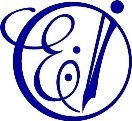
Editorial Inspirations provides independent editing, indexing, and proofreading for projects from newsletters and publications to manuscripts, both fiction and nonfiction. Through experience and training, April Michelle Davis has developed her working style: Get to know the needs of the author or publisher by being professional and pleasant and help develop the best writing to suit publication.
Education
Prior to starting Editorial Inspirations in 2001, April Michelle Davis worked as an assistant editor at the National Society of Professional Engineers and a program assistant for the American Prosecutors Research Institute. April Michelle earned a master of professional studies degree in publishing from George Washington University and a bachelor of arts degree in English from Messiah College. In addition to the degrees, she holds the following certificates: Editing (University of Virginia), book publishing (University of Virginia), and professional editing (EEI Communications).
Awards
- Bonjour 40: A Paris Travel Log (40 years. 40 days. 40 seconds.), written by Karen Chase and edited by April Michelle Davis, has won three eLit Awards: the eLit Silver Medal for Best Non-fiction Travel/Essay e-book, the eLit Silver Medal for Best Book Trailer, and the eLit Gold Medal for Best Author Website.
- Big Wave Surfing, written by Ken Thurber and edited by April Michelle Davis, has received numerous awards in 2011 and 2012.
- Social Media Marketing Expert on the Board of Experts, National Association of Independent Writers and Editors.
- Member of the Month, National Association of Independent Writers and Editors (June 2011).
- Writer’s Digest Your Opening Line Contest – Honorable Mention (December 2006).
- Writer’s Digest Your Opening Line Contest – Honorable Mention (September 2006).
Professional Affiliations
April Michelle frequently attends workshops, conferences, book festivals, and writers’ retreats—including the Communication Central Conference, University of Iowa Writers’ Workshop, Sewanee Writers’ Conference, Duke University Writers’ Workshop, James River Writers Conference—and she has been a member of the Editorial Freelancers Association since 2005, the American Society for Indexing between 2009 and 2015, and the National Association of Independent Writers and Editors since 2010, and the American Copy Editors Society since 2012.
